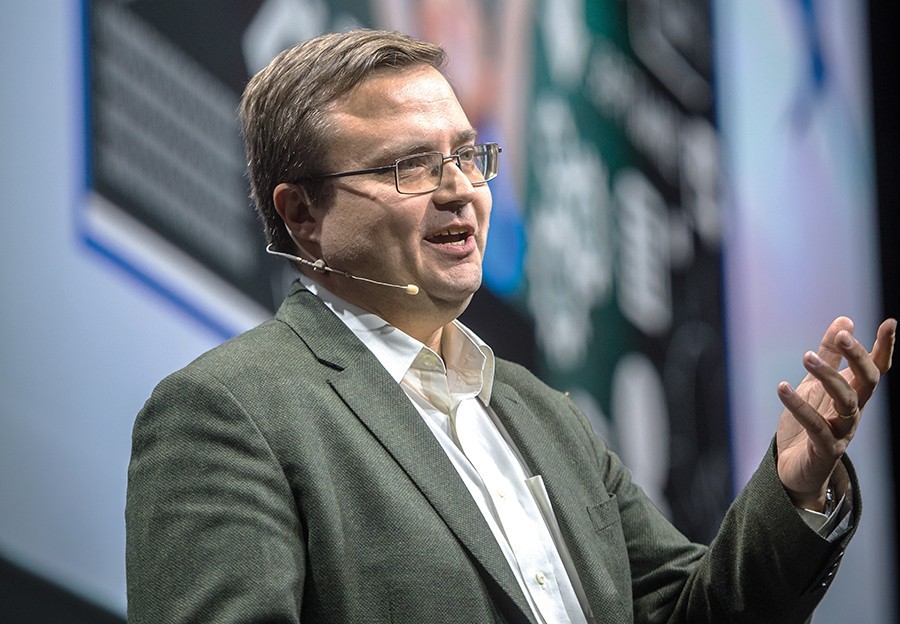In today’s plugged-in world, kids need to think critically and learn basic coding. Cassi Camilleri speaks to Headstart founder Klaus Conrad about his mission to give children the leg up they need to learn these key skills.
For most, education is one of life’s primary objectives. Be it centered around academia, the relationships we cherish, or even ourselves, knowledge is a coveted boon. Childhood is shaped by learning and the teachers who make it possible. But while many educators have the best of intentions to instill children with a healthy curiosity about the world, wide gaps in curricula continue to afflict their efforts.
With three young boys of his own, Klaus Conrad sees these holes as ‘troublesome’. And he’s not the only one. The skills gap growing in science, technology, engineering, and math (STEM) is often described by experts as a bane to Malta and the world’s economies. ‘I have often complained that schools don’t do enough when it comes to teaching kids essential skills like critical thinking. For the first 16 years of their life, they’re expected to sit and listen instead of participate.’
Conrad started his career as a teacher and has first-hand knowledge of the difficulty met when trying to change teaching approaches. ‘There is a rigidity inherent in the system,’ he says. ‘That is why there is such a high turnover of teachers in the sector. It’s stifling.’
Conrad himself moved on to the private sector, working as a software specialist with a Canadian company in corporate performance management. ‘I loved it,’ he says, ‘but I realised that for many years decisions were out of my hands. Bad choices were made and progress stalled. I wanted to start making the decisions, taking the responsibility, but also reaping the benefits.’
Knowing that he needed a change in his life, Conrad started mulling over the skills gap question again. He was riddled with questions: how could he address the skills gap issue and help both children and schools? Where should he start?
Conrad considered doing an MBA but quickly dismissed the idea, as it would have ‘trained [him] to work in an established structure.’ He also thought about enrolling at the renowned Edward de Bono Institute to read for a course in creative thinking, ‘but it involved a residency in Sweden at the time. That was not going to be possible for me with a family and kids, so it was immediately ruled out,’ he says. Finally, he settled on a Masters in Entrepreneurship at the University of Malta’s Centre for Entrepreneurship and Business Incubation (CEBI).
Talking about his experience in the course, Conrad does not hold back. ‘It was life changing,’ he states. ‘It gave me the knowledge I needed and asked the right questions.’ A formative point was when Prof. Russell Smith asked the class to think about what would make them happy.
‘I always loved teaching but the last thing I wanted to do was move into something that is familiar, and regretting it,’ says Conrad. That is when Headstart Ltd. found its feet: an educational technology (edtech) company set up to identify problems within education and find practical solutions for them.
Mind the gap
With the rise of technology, coding is becoming a required skill. Writing in the language of computers is the backbone of nearly everything related to technology. Your browser, your phone, the apps on it, social media, and every other website in existence, all of them are built with code. This said, in Europe, according to various EU studies, there will be around 750,000 unoccupied jobs by 2020. With this gap in mind, Conrad started looking into local after-school activities, and found another. While some short summer courses existed, he found no long-term, structured activities related to technology and programing.
‘Learning coding and programming is much like learning an instrument. You need practice. You need to do it over and over again. The fact that there is nothing along the same lines is just nonsensical,’ says Conrad. Alarmed by the lack of outcry at children missing this opportunity, he took an analytical approach and looked into the thinking behind it. ‘I soon understood why this was happening. The people who realise coding is important are normally from IT, so they teach their own kids. The ones who don’t know coding don’t seek it out.’
And so, Headstart began developing a series of after-school coding lessons, starting with Easypeasy coding.
Easypeasy coding is for kids between the ages of five and ten. ‘They come to the lessons, have fun, play with robots, and develop computational thinking skills. It’s that simple,’ Conrad says. Another ‘simple’ but genius idea he had was to also encourage parents to attend. ‘When you have five year olds, what is the most important thing in their lives? Their parents. Engage the parents and you have the kids. They learn together and start using the same language. The whole thing becomes a nourishing family activity,’ Conrad smiles.
To make sure kids continue on their educational journey, they then created the tech club TeenTronik with sessions aimed at 11 to 16-year-olds. ‘In Malta, we have a problem with attracting young people to education. We have a problem with keeping them within the educational system,’ Conrad says. Looking at the country’s rate of early school leaving, he is not wrong. In a previous THINK article, we spoke to Prof. Carmel Borg, who shed light on the situation. His studies showed that two out of 10 students in Malta were early school leavers, meaning that a fifth of our local student population is neither in school, nor in training, and with less than five SEC exams under their belt.
‘Our approach is to bring them back by offering education that is fun, engaging, and practical. We learn how to build a circuit, not just about the theory of electricity,’ says Conrad. ‘It’s about giving kids the skills to turn their ideas into actual tangible things from the word go. We foster the entrepreneurs of tomorrow by giving them the skills they need to produce the products they will be making.’
All aboard! Partnerships and connections

One of the biggest leaps for the venture came about by shifting thinking. When developing the courses, Conrad kept reminding the team that they did not have to reinvent the wheel. He notes how other companies in the edtech sector not only invest in crafting their version of the perfect course but they also build their own line of products to go with it from scratch and roll everything out.
‘What I discovered is that if you provide a service, you don’t have to provide every single product yourself. You can identify what works and bring the different elements together. In our case, we built a curriculum and became curators of various products that acted as resources for kids to work with. One of Headstart’s first partners were Evollve Inc., a tech company whose focus is on introducing new ways to combine social interaction with digital apps. Their star product has been the famous line-sensing robot, Ozobot.
Conrad says, ‘I was looking for a product that has zero barriers for users. I couldn’t find anything simpler than paper and a marker and asking people to draw. Parents and children could use the Ozobot so easily and learn how to give commands while doing it. As we started using Ozobot in classroom settings, we also realised that we could differentiate the product from others by directly showing parents how useful and educational it was. This in turn meant that we established a direct distribution channel to parents, bypassing retailers. We were adding real value for the manufacturer.’
When I ask how Conrad establishes these partnerships, he gave a simple answer: ‘We reach out to companies on the phone. We call them up and say we like their work and would like to use it within our courses. When you have another person at the end of the line, the dynamic is more conducive to success than an email.’
Now that the course has grown, companies themselves are approaching Headstart to introduce their products. After a successful Kickstarter campaign, Scottish robotics company Robotical launched Marty, a new generation, 3D-printed, customisable walking robot. Having met at a local robotics fair, Robotical sent Headstart the very first production of Marty worldwide to be used in the programme.
‘When people see that you believe in what you’re doing, that goes a long long way. Even if you don’t have the financial clout. A lot of business boils down to personal relationships,’ Conrad asserts.
Getting there
But the journey to success hasn’t been without its challenges. We now live in a world that is becoming increasingly obsessed with work. The more hours we spend at our desks, slaving away, the better we are, apparently. ‘When it comes to entrepreneurship, there’s this ‘all or nothing’ mentality that just doesn’t work. I reject the notion completely.’ When Headstart was in its infancy, Conrad had a specific plan in mind for how it would work. Having a family, he wanted to make sure that the business would not put them at risk in any way.
‘A lot of these ideas one hears: that you have to leap, you have to fly, you have to give it 100%. It’s damaging. Everyone has their own circumstances and responsibilities. What really makes an entrepreneur is somebody able to define which movement they need to make to achieve what they want to do. If I can’t fly because I have children tying me down, then I need to find a way to get to point B in a way that works for me.’
Conrad encourages budding entrepreneurs to carve their own path. ‘You don’t have to stick with any particular motto of how things should be. You need to find your own. This romanticised idea of being a pauper while you build a business, pay off your investors and move to something else is damaging. No. You need to find a way to make it sustainable from the get-go to have it grow.’
This approach has paid off for Headstart. After being founded in October 2015 and launched officially in January 2016, they began giving classes in three schools. Now, they are in seven with demands and requests chasing them wherever they go. Due to the retention rate of students, currently standing at 90%, Headstart is consistently looking for new teachers, and this has been a tough process.
‘Finding the right people is absolutely the biggest challenge,’ says Conrad, pointing out his belief that teachers have the biggest responsibility in the world—to instill the next generation with curiosity, knowledge, and values. However, Conrad remarks how he has experienced an unwillingness to learn and adopt new approaches among some teachers that he has met. ‘But for me, growing fast is not a priority. I want us to grow at a rate that maintains quality, because that is the most important part. This is how we remain sustainable,’ he says.
Fruitful thoughts
For Conrad and Headstart, the future looks bountiful. Recently, the company launched its first set of classes in France, Dubai, Abu Dhabi, and Belgium, and will soon launch in Chile, Egypt, Lebanon, and Jordan. The one thing Conrad says he will continue to do throughout this journey is to listen to the kids that attend their classes. ‘Kids are smart and we need to listen to them. We will continue to do so and build on the work we have done, offering them more fun and more diversity,’ he says.
At the moment, Headstart is working with kids. Conrad says they are shaping ‘little entrepreneurs’ by bringing subjects together and crossing disciplinary divides to create a teaching structure that is more holistic. He hoped that Headstart’s approach will have ripples into the future, not only in growing the volume of technical professionals, but by connecting them. ‘Us ‘nerds’ grow up alone. With Headstart, we’re bringing them together in a space that celebrates and encourages them.’





Comments are closed for this article!